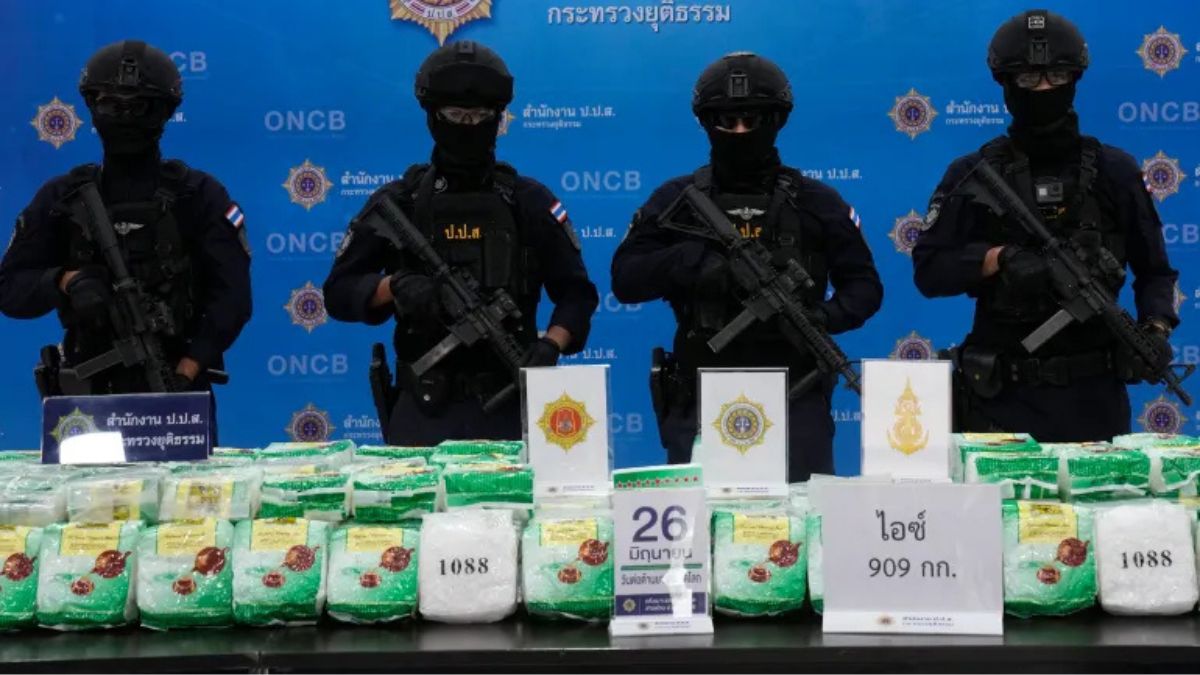Record meth seizures in Southeast Asia signal alarming surge in illicit drug trade: UN

Southeast Asia is seeing a record growth in drug seizures, indicating that the illicit narcotics industry is growing with it, a new UN report said on Wednesday.
Methamphetamine seizures, totalling 236 tonnes in 2024, saw a 24 per cent increase over 2023. This increase applied to its crystalline and tablet forms, with the latter going for as little as $0.6 (approximately ₹50 in India) in Myanmar. Roughly 1 billion tablets were seized last year in Thailand.
“The sustained flood of methamphetamine [and other dangerous drugs] to markets in the region has been driven by industrial-scale production and trafficking networks operated by agile, well-resourced transnational organized criminal groups,” the annual report by the United Nations Office on Drugs and Crime (UNODC) explained.
“We are clearly seeing unprecedented levels of methamphetamine production and trafficking from the Golden Triangle, in particular Myanmar’s Shan State,” Benedikt Hofmann, UNODC acting regional representative, was quoted as saying in an Associated Press report.
The 'Golden Triangle' is a secluded, mountainous region where the borders of Myanmar, Laos and Thailand meet, notorious for being one of the hotpots of a thriving opium economy, facilitated by poor law enforcement. Methamphetamine production soon overtook that of opium, being easier to produce on an industrial scale, and therefore, cheaper to sell.
The 'Golden Crescent' is another such mountainous region comprising parts of Afghanistan, Pakistan and eastern Iran, that has shown a similar change in drug production.
The UNODC report explains that drug traffickers have diversified routes to markets, both within Southeast Asia and beyond, one of the key reasons for a surge in drugs “across not only East and Southeast Asia, but also increasingly into South Asia, in particular Northeast India”.
Unlike plant-based drugs that require large-scale cultivation, synthetic drugs can be manufactured in small, concealed labs with minimal expertise. This is what reduces production costs, further reducing the drug's price in a market growing at an alarming pace.
It also allows traffickers to quickly adapt, shifting locations and modifying chemical compositions to evade detection, a separate UNODC article (dated March 2025) said.
The potency of these substances, coupled with new trafficking tactics such as drone deliveries and smaller, easily concealable shipments, make law enforcement efforts increasingly complex.
ALSO READ | Drug menace in Kerala: Will the government bridge the gaps in enforcement?
The 2025 Annual Threat Assessment (ATA), released in March 2025, confirms the UNODC data, as it identified India and China as “sources of precursors and equipment for drug traffickers”. The ATA is the American Intelligence Community’s official, coordinated evaluation of an array of threats to US citizens, US territory, and US interests in the world.
'International intelligence sharing can curb increase in drug trade'
Vineet Vinayak, Additional Director General of the Narcotics Control Bureau (NCB), calls for international intelligence sharing to curb this increase. He also speaks of digital platforms by the Indian government, such as NIDAAN, ICJS, NATGRID, and Manas to strengthen drug law enforcement.
“We remain a strong advocate for strengthening international cooperation to address psychoactive substances and fentanyl analogs,” he said, in the UNODC article dated March 2025.
Says Dr Suruchi Pant, UNODC’s Deputy Representative for South Asia, in the same UNODC article: “The global drug problem affects us all and demands a united response. As synthetic drugs evolve, trafficking networks adapt, and drug-related crimes intersect with other forms of organized crime, we must strengthen our commitment, invest in effective solutions, and ensure that help reaches those who need it most.”
ALSO READ | We are setting up an integrated cyber shield for India, says Union Home Minister Amit Shah in an exclusive interview.
India has entered active (cyber security) collaborations with organisations like Interpol, G7, the UN and BRICS, and has also signed cyber security agreements with many countries, including America, Australia and Germany. Similarly, collaborations with the UN, SCO and BRICS have also been fostered, bolstering the country's cyber security.
The new UNODC report, too, says that strengthening a nation's cyber security will, in turn, provide for secure intelligence sharing—especially on the drug trade—leading to a possible stoppage in the illicit trade's alarming growth.
Business